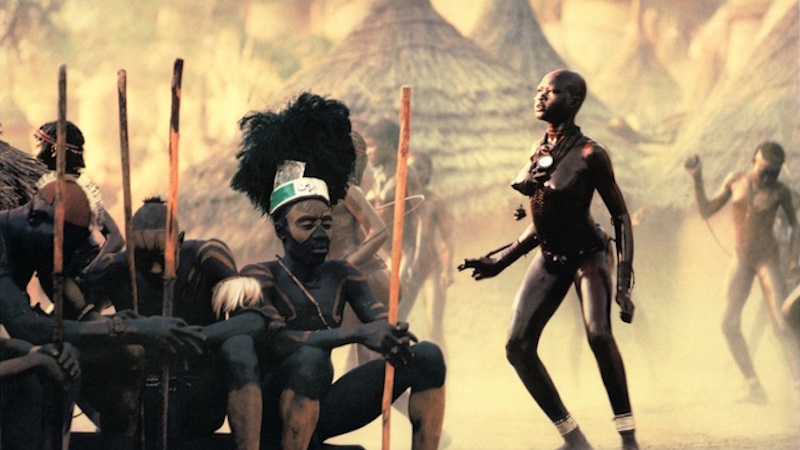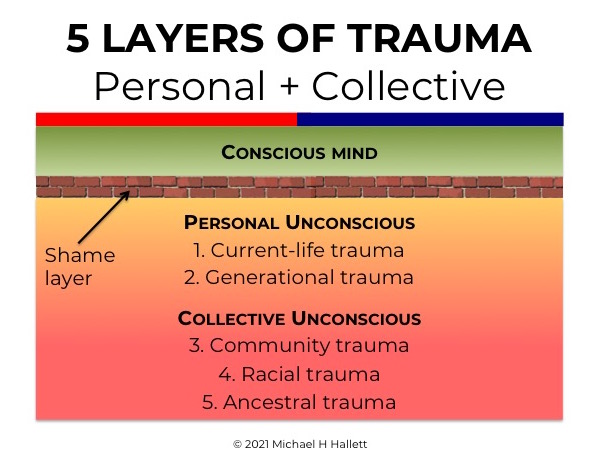What is ancestral trauma?
- 21 May 2019
- Posted by: Michael H Hallett
- Category: Ancestral trauma , Cornerstones ,

In Trauma exists as a series of ripples, I describe the multiple, interconnected sources of trauma that may exist in our lives. I’ve broken down these sources into five key layers. In this article I’m going to focus on the fifth layer, what I term ‘ancestral trauma’.
Ancestral trauma is trauma that occurred thousands of years ago yet remain embedded as genetic programming in the collective unconscious.
First of all, let’s place this trauma in the context of the other key sources. All trauma is buried in our unconscious under a layer of shame and denial. Trauma can be personal (unique to us) or collective (shared with circles of others).

- Current-life trauma—trauma from events in our current lifetime
- Generational trauma—trauma inherited from our immediate ancestors, typically from unresolved events that occurred to our parents and grandparents
- Community trauma—trauma that affects an entire, specific community
- Racial trauma—trauma that affects an entire, specific race
- Ancestral trauma—trauma inherited from remote ancestors that affects everyone living in patriarchal societies
Ancestral trauma
Ancestral trauma is trauma that occurred thousands of years ago yet remain embedded as genetic programming in the collective unconscious. They are transmitted from one generation to the next via epigenetic inheritance.
We can experience ancestral trauma concurrently with more recent issues rising to the surface for healing, or independently. These traumas—yes, there’s more than one—have a curious quality of relating to our own lives while simultaneously being very ancient in origin.
Richard Schwartz, creator of the Internal Family System model for healing trauma, refers to these as ‘parts’. These parts are frozen in time. They are parts of ourselves that are simply trying to protect us from the trauma that gave rise to them. Healing consists of retrieving and reassigning these parts. This means bringing them into the present them giving them new, healthy functions.
At the 2021 Intergenerational Trauma Conference, Peter McBride, Director of the Cohen Center for Holocaust and Genocide Studies, noted that inherited traumas are not memories. The sufferer “holds on to the experience as a living experience”. Collectively, we respond to current events through the filter of past traumas.
The Fall
How far back does ancestral trauma go?
As far as I can tell, to the Biblical Fall: the expulsion from the Garden of Eden into the desert. The story in Genesis with the ultimate all-star cast—Adam, Eve, a snake, an apple and an irate god—appears to be a folk memory of a psychological trauma affecting humanity that anthropological evidence totally supports.
In Saharasia, geographer James DeMeo documents how desertification in the Sahara, Arabia and Central Asia from around 4000 BC transformed peaceful hunter-gatherer and early agricultural societies into warring dynasties bent on conquest in the competition for increasingly scarce food sources.
In The Fall, university lecturer Steve Taylor documents the accompanying “ego explosion”. He writes that “the main event in human history is a sudden, massive regression – a dramatic shift from harmony to chaos, from peace to war, from life-affirmation to gloom, or from sanity to madness.”
This profound psychological shift paved the way for modern, individuated humanity—yet it came at significant cost. It created what I call the Patriarchal Operating System, the acquisitive, consumptive and destructive psychological model that’s crippling humanity and the planet.
Key traumas
The Fall seems to have inflicted five key psychological traumas:
- A fundamental separation from both nature and the mother figure. I link these because they’re macro- and micro-level versions of the same thing. Nature ceased to be a bountiful provider. So did mothers. Children were separated at birth to encourage violence. This conferred an evolutionary advantage by improving the odds of survival.
- An implicit zero emotional and sexual growth environment that condemns us to stagnant relationships with ourselves and our nearest and dearest. This stems from trauma 1.
- A core sexual wound stemming from separation from the mother and denial of sexually pleasurable breast-feeding. This led to circumcision of men, and the sexual subjugation and sexual enslavement of women.
- The embedding of a slave mentality (including sexual slavery) whereby we unconsciously give away power to socio-political institutions and rules, e.g., the concept of nationality.
- The embedding of core victim (feminine) and victimizer (masculine) energies in the human psyche, stemming from the previous traumas. This dynamic, in highly watered-down form, still resides in the collective unconscious.
“Ego explosion”
These traumas happened pretty much in the sequence listed above, no doubt with some overlap over a long timespan. Each ancestral trauma damaged us in specific ways. When understood, they can be plainly seem in contemporary human behaviour at both the macro (global) and micro (personal) levels.
In combination, these traumas impelled Steve Taylor’s “ego explosion”. They also laid the bedrock for the patriarchal civilisations that ensued. These civilizations have all been inherently anti-female, anti-child and anti-sex. We’ve been dealing with the emotional and sexual damage ever since.
The mother wound
Of the traumas listed above, the separation from nature and nurture, from the planet and from our mothers, is the original wound. To emphasise its importance, I’ve termed it the mother wound and greatly expanded on it.
During the 1991 Gulf War, Iraqi leader Saddam Hussein memorably used the phrase, “The mother of all battles.” The ‘mother of all…’ construct has since been used in many ways. When it comes to emotional wounds, this mother wound at the collective core of humanity is ‘the mother of all wounds’.
It accounts for our disconnection from our selves and from the planet—which in turn accounts for the state of the environment.
Humanity will not know true freedom until it releases all these ancestral traumas.
Image: Leni Riefenstahl, The Last of the Nuba (1974)
